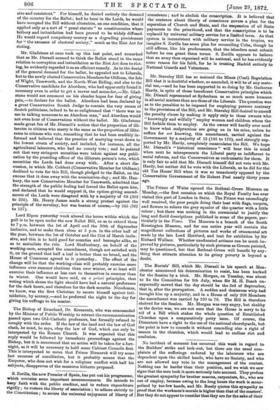Mr. Gladstone at once took up this last point, and
remarked that as Mr. Disraeli seemed to think the Ballot stood in the same relation to corruption and intimidation as the Riot Act does to riot- ing, he evidently regarded it as an efficient remedy. As to the denial of the general demand for the ballot, he appealed not to Liberals, but to the newly elected Conservative Members for Olclliam, the Isle of Wight, Tamworth, and the North-West Riding, and also to the Conservative candidate for Aberdeen, who had apparently found it necessary even in order to get a mover and seconder,—Mr. Glad- stone would not comment on his slender hopes for fear of giving pain,—to declare for the ballot. Aberdeen had been declared by a great Conservative Scotch Judge to contain the very cream of Scotch politicians, indeed to be so enlightened that "there was no use in talking nonsense to an Aberdeen man," and Aberdeen would not even hear of Conservatism without the ballot. Mr. Gladstone made great fun of Mr. Disraeli's notion that the proportion of illi- terates to citizens who marry is the same as the proportion of illite- rates to citizens who vote, remarking that he had been credibly in- formed and believed that the practice of marrying went down to the lowest strata of society, and included, for instance, all the agricultural labourers, who had no county vote ; and he pointed out that very stringent securities were taken against any publi- cation by the presiding officer of the illiterate person's vote, which securities the Lords had done away with. After a short dis- cussion, in which Mr. Cobbett (Conservative Member for Oldham) declined to vote for this Bill, though pledged to the Ballot, on the excuse that it does away with the nomination-day ; and Mr. Han- bury, the new Conservative Member for Tamworth, admitted that the strength of the public feeling had forced the Ballot upon him, and declared that he would support it, the option-giving amend- ments of the Lords were disagreed with by a majority of 68 (302 to 234). Mr. Henry James made a strong protest against the principle of the scrutiny, but was beaten of course,—by 245 (382 to 137).


































 Previous page
Previous page